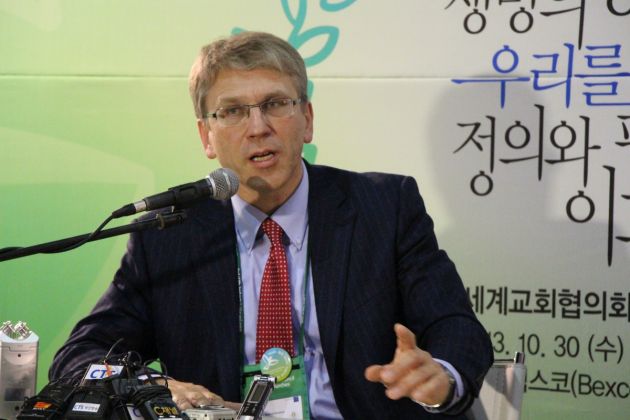World churches leader says 'senseless' South Sudan war must end now

Calling for an end to the war in South Sudan, the head of the World Council of Churches has expressed shock at how leaders of both sides of the conflict engulfing the world's newest country have led their people into suffering.
"The senseless war in South Sudan must end now," said the World Council of Churches general secretary Rev. Olav Fykse Tveit, following the visit of an ecumenical delegation to churches in Juba, South Sudan on May 2.
"It is shocking to see how leaders in both parties involved in the conflict have led their own people to such pain and suffering," Tveit said in a statement released Monday.
"From the stories I was told, it is impossible to comprehend the scale of killings and atrocities taking place."
South Sudan is a landlocked country in northeastern Africa inhabited my people who are mainly followers of Christianity or African traditional religions that gained its independence from mainly Islamic Sudan in 2011.
Independence was preceded by decades of civil war in which more than 2.5 million people were killed and millions became refugees both within and outside the country. Church leaders played a key role in the negotiations process for independence.
A Norwegian Lutheran, Tveit stressed the need for leaders on both sides to use negotiations set to resume this week as an opportunity to agree and implement a ceasefire immediately.
He said this will enable aid groups, including the WCC-supported ACT Alliance, to respond effectively to the humanitarian crisis resulting from the violence.
During their visit the group expressed support for local churches, advocated for a cease-fire, urged progress in the ongoing peace talks and encouraged support to humanitarian initiatives in the country.
SOUTH SUDAN VICE-PRESIDENT
They first met with the South Sudan vice-president, James Wani Igga, the U.N. representative to South Sudan, Hilde Frafjord Johnson and four political detainees from the opposition in Juba, released recently by the South Sudanese government.
Calling on South Sudan's President Salva Kiir and rebel commander Riek Machar to engage in peace talks, the group said the leaders must find a political solution to end the conflict, as enough damage has already been done.
Tveit noted that thousands of people have been killed and many have been displaced and warned that unless people can plant their seeds in the coming months, they will face an acute threat of famine."
One goal of the pastoral visit was to encourage the churches in Sudan to keep pressing for an end to the violence.
"The people and the churches in South Sudan should know they are not left alone as they cry for peace and justice," Tveit said. "The world cannot leave South Sudan alone."
"As we have supported South Sudanese in their struggles for independence, we must support them in this time of crisis. The international community must address the risks of famine and hunger," Tveit added.
The WCC head expressed his appreciation for humanitarian efforts by the United Nations and the ACT Alliance in South Sudan.
He said he hopes to see visible results from an upcoming meeting in May in Oslo aimed at providing an increase in humanitarian aid to the country.
"Churches in South Sudan have a significant role in national dialogue affirming unity and a sense of nation-building by strengthening a process of reconciliation," Tveit said. "In this process of reconciliation, youth and women must be empowered."
Tveit also urged that justice be restored after peace is established. He said that there should be a justice mechanism both at the national and international levels which should investigate atrocities in South Sudan and pave the way for reconciliation.
The delegates also met with South Sudanese Bishop Michael Taban Toro, Rev. Mark Akec Cien, and representatives of the ACT Alliance, Finnish Church Aid, Caritas Internationalis and Norwegian Church Aid in Juba.
The ecumenical delegation included, Tveit; WCC moderator Dr. Agnes Abuom; ACT Alliance general secretary John Nduna; general secretary of the World YWCA Nyaradzayi Gumbonzvanda; the WCC's former general secretary and ecumenical special envoy for South Sudan and Sudan, Rev. Samuel Kobia, who also represented the All Africa Conference of Churches; and the WCC programme executive for advocacy for Africa, Dr Nigussu Legesse.
The World Council of Churches promotes Christian unity and represents more than 500 faithful from Protestant, Orthodox, Anglican and other traditions in over 140 countries. The WCC works cooperatively with the Roman Catholic Church which serves on some of its bodies.